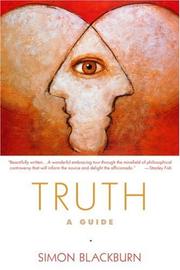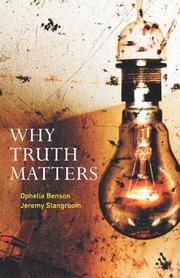| Listing 1 - 10 of 859 | << page >> |
Sort by
|
Book
Year: 1953 Publisher: Louvain: Publications universitaires de Louvain,
Abstract | Keywords | Export | Availability | Bookmark
 Loading...
Loading...Choose an application
- Reference Manager
- EndNote
- RefWorks (Direct export to RefWorks)
Book
Year: 1951 Publisher: Paris: Hermann,
Abstract | Keywords | Export | Availability | Bookmark
 Loading...
Loading...Choose an application
- Reference Manager
- EndNote
- RefWorks (Direct export to RefWorks)
Book
Year: 1934 Publisher: Paris: Alcan,
Abstract | Keywords | Export | Availability | Bookmark
 Loading...
Loading...Choose an application
- Reference Manager
- EndNote
- RefWorks (Direct export to RefWorks)

ISBN: 2130402089 9782130402084 Year: 1996 Volume: 1399 Publisher: Paris: PUF,
Abstract | Keywords | Export | Availability | Bookmark
 Loading...
Loading...Choose an application
- Reference Manager
- EndNote
- RefWorks (Direct export to RefWorks)
Genetics --- Epistemology

ISBN: 9780195315806 0195315804 Year: 2007 Publisher: Oxford: Oxford university press,
Abstract | Keywords | Export | Availability | Bookmark
 Loading...
Loading...Choose an application
- Reference Manager
- EndNote
- RefWorks (Direct export to RefWorks)
The author of the highly popular book Think, which Time magazine hailed as "the one book every smart person should read to understand, and even enjoy, the key questions of philosophy," Simon Blackburn is that rara avis-an eminent thinker who is able to explain philosophy to the general reader. Now Blackburn offers a tour de force exploration of what he calls "the most exciting and engaging issue in the whole of philosophy"-the age-old war over truth. The front lines of this war are well defined. On one side are those who believe in plain, unvarnished facts, rock-solid truths that can be found through reason and objectivity-that science leads to truth, for instance. Their opponents mock this idea. They see the dark forces of language, culture, power, gender, class, ideology and desire-all subverting our perceptions of the world, and clouding our judgement with false notions of absolute truth. Beginning with an early skirmish in the war-when Socrates confronted the sophists in ancient Athens-Blackburn offers a penetrating look at the longstanding battle these two groups have waged, examining the philosophical battles fought by Plato, Protagoras, William James, David Hume, Hans-Georg Gadamer, Jacques Derrida, Michel Foucault, Richard Rorty, and many others, with a particularly fascinating look at Nietzsche. Among the questions Blackburn considers are: is science mere opinion, can historians understand another historical period, and indeed can one culture ever truly understand another. Blackburn concludes that both sides have merit, and that neither has exclusive ownership of truth. What is important is that, whichever side we embrace, we should know where we stand and what is to be said for our opponents.
Truth --- Epistemology
Book
ISBN: 9782130586074 2130586074 Year: 2011 Publisher: Paris: PUF,
Abstract | Keywords | Export | Availability | Bookmark
 Loading...
Loading...Choose an application
- Reference Manager
- EndNote
- RefWorks (Direct export to RefWorks)
Publié initialement dans la collection "Que sais-je ?", L'épistémologie génétique pose les linéaments d'une méthode pour appréhender la genèse de la connaissance et suivre les conditions de son développement. Réédité à six reprises, l'ouvrage de Jean Piaget demeure un grand classique de la théorie de la connaissance.
Book
ISBN: 9781137363152 1137363150 Year: 2014 Publisher: New York (N.Y.): Palgrave MacMillan,
Abstract | Keywords | Export | Availability | Bookmark
 Loading...
Loading...Choose an application
- Reference Manager
- EndNote
- RefWorks (Direct export to RefWorks)
"Conspiracy theories are a popular topic of conversation in everyday life but are often frowned upon when it comes to academic discussions. Looking at the recent spate of philosophical interest in conspiracy theories, The Philosophy of Conspiracy Theories asks whether the assumption that belief in conspiracy theories is typically irrational is well founded. The Philosophy of Conspiracy Theories is aimed at both the philosopher and the non-philosopher. It is a qualified defence of belief in conspiracy theories: belief in conspiracy theories can be rational in some circumstances. It covers such issues as: who might be consider a qualified conspiracy theorist; how do we analyse claims of disinformation; is our reliance on official theories a good reason to be suspicious of rival conspiracy theories; and what we should do when official theories and conspiracy theories are in conflict? "--
Book
Year: 1934 Publisher: Paris: Alcan,
Abstract | Keywords | Export | Availability | Bookmark
 Loading...
Loading...Choose an application
- Reference Manager
- EndNote
- RefWorks (Direct export to RefWorks)
Epistemology --- Science --- Physics

ISBN: 9780826476081 0826476082 Year: 2006 Publisher: London: Continuum,
Abstract | Keywords | Export | Availability | Bookmark
 Loading...
Loading...Choose an application
- Reference Manager
- EndNote
- RefWorks (Direct export to RefWorks)
Truth has always been a central preoccupation of philosophy in all its forms and traditions. However, in the late twentieth century truth became suddenly rather unfashionable. The precedence given to assorted political and ideological agendas, along with the rise of relativism, postmodernism and pseudoscience in academia, led to a decline both of truth as a serious subject, and an intellectual tradition that began with the Enlightenment. Why Truth Matters is a timely, incisive and entertaining look at how and why modern thought and culture lost sight of the importance of truth. It is also an eloquent and inspiring argument for restoring truth to its rightful place. Jeremy Stangroom and Ophelia Benson, editors of the successful butterfliesandwheels website - itself established to 'fight fashionable nonsense' - identify and debunk such nonsense, and the spurious claims made for it, in all its forms. Their account ranges over religious fundamentalism, Holocaust denial, the challenges of postmodernism and deconstruction, the wilful misinterpretation of evolutionary biology, identity politics and wishful thinking. Why Truth Matters is both a rallying cry for the Enlightement vision and an essential read for anyone who's ever been bored, frustrated, bewildered or plain enraged by the worst excesses of the fashionable intelligentsia.
Truth --- Epistemology --- Philosophy
Book
ISBN: 9780190620325 0190620323 019062034X 0190620358 0190620331 0190939273 9780190939274 Year: 2016 Publisher: New York: Oxford university press,
Abstract | Keywords | Export | Availability | Bookmark
 Loading...
Loading...Choose an application
- Reference Manager
- EndNote
- RefWorks (Direct export to RefWorks)
Interest in emergence amongst philosophers and scientists has grown in recent years, yet the concept continues to be viewed with skepticism by many. In this book, Paul Humphreys argues that many of the problems arise from a long philosophical tradition that is overly committed to synchronic reduction and has been overly focused on problems in philosophy of mind. He develops a novel account of diachronic ontological emergence called transformational emergence, shows that it is free of the problems raised against synchronic accounts, shows that there are plausible examples of transformational emergence within physics and chemistry, and argues that the central ideas fit into a well established historical tradition of emergence that includes John Stuart Mill, G.E. Moore, and C.D. Broad. The book also provides a comprehensive assessment of current theories of emergence and so can be used as a way into what is by now a very large literature on the topic. It places theories of emergence within a plausible classification, provides criteria for emergence, and argues that there is no single unifying account of emergence. Reevaluations of related topics in metaphysics are provided, including fundamentality, physicalism, holism, methodological individualism, and multiple realizability, among others. The relations between scientific and philosophical conceptions of emergence are assessed, with examples such as self-organization, ferromagnetism, cellular automata, and nonlinear systems being discussed. Although the book is written for professional philosophers, simple and intuitively accessible examples are used to illustrate the new concepts.
Emergence (Philosophy) --- Epistemology --- Metaphysics --- Ontology
| Listing 1 - 10 of 859 | << page >> |
Sort by
|

 Search
Search Feedback
Feedback About UniCat
About UniCat  Help
Help News
News